- Home
- Susanna Kearsley
Mariana Page 4
Mariana Read online
Page 4
“Children’s books, isn’t it, my dear?” Mrs. Hutherson had asked in her gentle voice. “How clever of you.” Her blue eyes struck a familiar chord in my memory, but she had gone before I could grasp the connection.
The quiet couple who came last with a bottle of raspberry cordial benefited from their position by being offered the best selection of treats. The coffee table in my sitting room was by this time so loaded with edible offerings that anyone would have thought I’d spent hours preparing for a neighborhood tea party.
Any lingering doubts my visitors may have had regarding my respectability were put to rest, emphatically and unexpectedly, by the arrival of my brother, wearing his clerical collar and looking eminently pious. So pious, in fact, that I doubted whether any of his own parishioners would have recognized him.
Shortly after noon, when the crowd had cleared, Tom leaned back in his chair, linking his hands behind his head.
“I congratulate you,” he said. “My own neighbors didn’t lay siege to me until I’d been in the village a week. How long have you been here, now? Two days?”
“I moved in on Tuesday, so this is my third day here. Feet off the coffee table, please.”
“Sorry.” He moved his shoes obediently. “I hope you don’t mind my dropping in on you like this. I suppose I could have called first.”
“You couldn’t have picked a better time,” I assured him warmly. “It’ll do wonders for my image. By teatime it’ll be all over town that I’m related to a vicar.”
“Or that you’re having an affair with one.” Tom grinned. “Village people have terribly suspicious minds, you know.”
I ignored him. “It’s your day off, I take it?”
“Yes. I left the parish in the capable hands of my new curate, young Mr. Ogilvie. You’d like him, Julia. He’s much less tedious than his predecessor. Of course, his views may be a little progressive for my flock, but he means well.”
“Anything would be an improvement on your last curate,” I agreed with feeling. “Michael something, wasn’t it? Very low church, never smiled, always bubbling over with hell-fire and damnation?”
“That’s the one.”
“Whatever happened to him?”
“I managed to have him transferred to a parish up north. I felt I’d done my penance,” Tom said, smiling. “Anyway, back to the subject of my day off. I promised the parents I’d stop in this week and see how you were getting on. How are you getting on?”
“Quite well, thanks. I’ve got most of the downstairs rooms sorted out, I think.”
“It looks very nice.” He let his gaze roam the sun-filled, spacious room. “It really is a lovely house. I am impressed. Are you going to give me the grand tour, or,” his gaze fell on the overloaded coffee table, “do I have to help with the washing-up first?”
I assured him that the washing-up could wait, and began the tour in the room we were in.
“Well, this, naturally, is the sitting room,” I said. “I need to buy a bigger carpet to protect this floor, and the curtains of course will have to go…”
“I see what you mean.” Tom eyed the garish floral chintz speculatively. “The windows themselves are nice, though. And I genuinely like the fireplace. What’s through here?” He indicated a connecting door on the far wall.
“Dining room.” I led him through.
“Julia!” My brother’s tone held admiration. “Where on earth did you get that dresser?”
“It’s quite something, isn’t it? It came with the house.”
The dresser was late Victorian, solid walnut, and nearly nine feet tall, its top brushing the plastered ceiling of the dining room. I suspected it had come with the house only because it would have needed a crane to budge it. The single piece of furniture so completely dominated the long room that one barely noticed the lack of table or chairs. On either side of the dresser, two tall windows looked out over the back lawn, adding to the impression of stately elegance.
From the dining room we walked through a swinging door into the scrubbed and Spartan kitchen with its old-fashioned pantry, then out through the narrow passageway into the paneled front hall. After a brief detour into the study, where Tom might easily have settled himself for the remainder of the day had I not dragged him out again, we climbed the angled staircase to the upper floor.
“Now, I haven’t done anything up here since the day I moved in,” I warned him, “so some of the rooms may be a little messy. Just so you don’t expect much.”
“Blast these ceilings.” Tom ducked too late and stepped onto the landing, rubbing the back of his head. “Made for midgets. How many bedrooms do you have?”
“Four. But I’m only using two of them. These two,” I indicated the closed doors to our left, “are just for storage, at present.”
“Very sensible.” Ever curious, Tom poked his head inside the first room and peered around. It was a long, narrow room, separated from my own by the attic stairs that ran behind the end wall. The light coming in the twin windows was partially blocked by the branches of a pear tree growing close against the front of the house. The other storage room occupied the front south corner, and the fact that it had only one window was compensated for by the presence of yet another fireplace.
“You’ll have to learn to chop wood,” my brother commented, and I pulled a face.
“Come off it, Tom. You’ve seen me light a fire before. The whole house would go up like a Roman candle.”
Tom grinned, and bent to examine the carved wooden mantelpiece. Leaving him there, I moved on ahead to the next door, which belonged to the small back corner room that I’d chosen to use as my studio. I hadn’t bothered to check on my supplies or equipment yet, having determined not to think about work for this first week, but it suddenly struck me that, since Tom was here, he might be coerced into helping me assemble my drawing board.
I was not normally inept when it came to routine mechanical tasks, but this particular drawing board—devised by a sadistic Swedish designer—always managed to defeat my best efforts, and left me sitting frustrated and helpless amid a jumble of chrome poles, assorted tools, and one less bolt than the directions called for.
Come to think of it, I thought, brightening, I hadn’t actually seen the movers carrying the table upstairs. Maybe it had been lost in the move. I pushed open the studio door, took two steps into the room, and stopped dead in confusion.
There was nothing there. Nothing of mine, anyway. Except for a low, narrow bed pushed against the back wall, and an antique clothespress in one corner, the room was completely empty.
“Well, that’s odd,” I said out loud.
“What’s odd?” my brother called back.
“This furniture isn’t mine,” I told him, moving back across the hall to the front bedroom. “They must have put my studio things in one of these rooms instead. There should be an easel and my drawing board and that great ugly chair. I just can’t imagine where…”
My voice trailed off as I rummaged amid the boxes, and my brother’s shadow moved past me into the hall.
“Julia,” he said, a moment later. “Come here.”
I found him standing in the doorway of my studio, hands on hips. “Now,” he said, as I joined him, “what do you see?”
I looked, blinked hard, and looked again. It was all there—the easel, the studio furniture, the untidy boxes of paints and brushes and paper… everything, just as it should be. Moreover, there was no sign to be seen of the bed or clothespress.
“You haven’t been nipping into the cooking sherry, have you?” Tom joked.
“But, Tom.” I shook my head, bewildered. “These things weren’t here a minute ago, honestly.”
My brother looked down at me, his expression concerned, and when he finally spoke, his voice had lost its mocking edge. “Listen,” he said, “why don�
�t we leave the rest of the tour until later? You must be exhausted after this morning.”
“I’m not crazy.”
“Of course you’re not. Feel up to a pot of tea?”
I trailed unhappily after him down the stairs.
“That room was empty when I looked.”
“I’m not saying it wasn’t. I’m not saying that you didn’t see what you said you saw. I just think there’s probably a good reason why you saw what you said you saw.”
“I see,” I said. “Such as?”
Tom lifted his shoulders in a shrug. “I don’t know. You’re tired, you’ve been pushing yourself too hard… when did you get to bed last night?”
“Late,” I admitted. “But I can’t believe that has anything to do with…”
“And what time were you up this morning?”
“Just after six. But…”
“There you are,” he said, raising his hands to emphasize his point. “You’re not getting enough sleep.”
I was familiar with my brother’s moods. I waited until the tea was brewed and we were sitting facing each other across the kitchen table, before I dared to contradict him.
“As a matter of fact,” I told him firmly, “I am getting plenty of sleep. And I’m not tired, honestly. I’ve not done any real work since I moved in here, I’ve only unpacked a few boxes.”
“You look tired.”
“Tom.” I smiled at his obstinacy. “Listen to me. I am very well rested. I’ve been sleeping like a log. And dreaming every night, come to that.”
“Really? That’s rather unusual for you, isn’t it? I thought you hardly ever dreamt.”
“Maybe it’s the country air.”
“What sort of dreams?”
“I really can’t remember most of them,” I said, frowning slightly as I drank my tea. “One of them was about a comet, I think. Yes, that was it… there were two comets, one right after the other, and everyone was saying how that meant something terrible was going to happen. What does Freud have to say about comet dreams?”
“Not Freud.” Tom shook his head. “Jung. And I really haven’t the foggiest idea. I didn’t study psychology. Which reminds me.” He sat forward suddenly. “Rod Denton is giving a dinner party Saturday week at his house in London.”
“How can my comet dream possibly remind you of Rod Denton’s dinner party?”
“Rod did study psychology,” Tom explained. “Among other things.” Roderick Denton had come down from Oxford at the same time as my brother, but had been destined for rather more worldly pursuits. He had married the daughter of an earl, inherited a house in Belgravia, and was doing quite well for himself in the financial world.
“Anyhow,” Tom continued, “his parties are usually rather fun. I thought you might care to come with me. Might do you good, getting out for a day.”
“You make it sound as though I’ve been cooped up here for weeks.
“I only thought,” he shot me a dark, sideways glance, “that you could use a break from all this work.”
“Well, I could, actually,” I conceded, draining my teacup with a smile. “Thanks. Saturday week, you said? What time?”
“Cocktails at six thirty. You remember where he lives?”
I nodded. “I’ll meet you there, then, if you like. I’m sure my friend Cheryl would be happy to put me up for the night. I can park the car at her place, up in Islington, and take the tube down to Rod’s. OK with you?”
“Fine.”
“Right. Are you ready for the rest of my guided tour?”
“Are you sure you feel up to it?”
“Of course. Besides,” I said, putting an affectionate arm around my brother’s shoulders, “I want you to take a look at my drawing board.”
He frowned. “I’ve already seen your drawing board.”
“A really close look, if you know what I mean.”
Tom caught my meaning and sighed heavily. “Don’t bat your eyes at me, my love, I know entrapment when I see it.” He led the way back up the stairs to the first floor, and I heard a shockingly irreligious oath as his dark head connected a second time with the low ceiling.
“And a good thing it is for you,” he said, turning to me with a broad grin, “that your neighbors weren’t around to hear that.”
***
Later that afternoon, I found myself once again on the narrow paved road leading into the village, walking with my face turned towards the wind and reveling in the cool, fragrant country air that blew the packing-box dust from my lungs.
Tom had been gone for nearly an hour. The remainder of his visit had passed smoothly—I had no more hallucinations, and to my great relief, every room we entered had appeared exactly as I had left it. I decided that my brother must have been right, after all. Tom, I reasoned, had an irritating habit of always being right. Perhaps I had been pushing myself too hard, trying to do too much all at once.
I had planned, after he left, to clear away the remains of the morning’s impromptu tea party, do the washing up, and try to tighten the leaking tap in the bath, but instead I decided to take Tom’s advice and get away from the house for a while.
My original thought had been to drop in at the Red Lion for a light meal and a friendly chat with Vivien, but the sun was shining and the road was beckoning, and the more I walked, the more I felt like walking.
I passed by the Red Lion, and the offices of Ridley and Stewart, Estate Agents, and the huddled cluster of shops. A short distance farther on, a massive stone portal rose on my right, its iron gate flung invitingly wide. A narrow dirt path, tidily edged and shaded by a tightly woven canopy of closely planted trees, curved away into the cool shadows. This, I correctly assumed, must be the entrance to the famed manor house.
Resisting the temptation to trespass, I stuck to the cobbled walk of the High Street. Time enough to see the manor another day, I told myself. Besides, the man who owned the Hall was away, Vivien had said. In France. Better to wait until he returned, and have a proper inside tour. I walked on to the quaint wooden lych-gate that I’d admired earlier and, pushing open the swinging half door, entered the silent churchyard.
There are few places in England so peaceful or oddly beautiful as a country churchyard, where the ivy grows thickly in the shadowy corners and trails across the weathered stones, their carved faces almost unreadable after countless years of exposure to the sun and rain. Many of the stones here were tilted at a precarious angle, leaning to one side like drunken sentries. Some of them had toppled from their post completely and had been propped with care against the outside wall of the church.
The church itself was small and plain, a squat building of sun-bleached stone topped by a square, crenellated tower. A faded, hand-lettered placard by the door proclaimed it to be the Church of St. John, with services on Sundays and Wednesday evenings. One push against the thick oak door and it swung obligingly inward on its heavy iron hinges, showing me an equally plain interior that nonetheless gave the impression of soaring space. The late-afternoon sunlight streamed in through narrow stained-glass windows and bathed the bare stone walls in a warm, glowing light.
My footsteps sounded uncommonly loud, a modern intrusion into this peaceful, holy place, as I walked slowly into the center of the church, reading the distinguished names on the square stone markers beneath my feet: Staynor, Alleyn, Hatch, de Mornay…
A violent explosion of sound brought my head up and around with a start, my heart leaping wildly against my rib cage. It was only a pigeon, trapped for a moment behind the rood screen, thrashing out in panic before it could work its way clear and beat a hasty exit through the half-open door.
My heart slowly returned to normal, leaving me feeling slightly dizzy, with a dull ringing in my ears, as though I were about to faint. The sunlit interior of the little church felt suddenly as sta
le and airless as a tomb, and I stumbled back outside, gulping air in deep, unsteady breaths.
In my confusion, I turned my back to the High Street and found myself in a shaded dirt lane, flanked by large, overhanging beech trees that rustled gently in the shifting breeze. My face was damp with perspiration, and a steady pounding sound rose above the ringing in my ears as I paused to rest, supporting myself with an outstretched hand upon one gnarled tree trunk. The pounding gradually became louder, more rhythmic, until it was recognizable as the sound of a horse’s hooves striking the tightly packed soil.
Looking up, I saw a solitary horse and rider approaching. A gray horse, carrying a tall man in dark clothing.
I blinked, my vision blurring, and the horse changed color, no longer gray now but chestnut, with a darkly flowing mane and tail. The man astride the horse changed, too, subtly, like clay poured from one mold into another, his outline indistinct in the mottled shadows of the lane. They drew nearer still, and still I neither moved nor spoke, standing rooted to my spot and staring like the village idiot.
Closer and closer the specter came, until the horse was pulled to a halt in front of me. I looked up. The sun was positioned directly behind the rider. Filtering through the trees, it created a blinding halo around the man’s dark head, and I sensed, rather than saw, his smile.
“Hello,” he said. “You must be my new neighbor. I’m Geoffrey de Mornay.”
I momentarily forgot the rules of proper etiquette. I raised my hand, smiled up at him, and fainted dead away at his horse’s feet.
Chapter 5
It was not, I decided, as I sat on Geoffrey de Mornay’s chesterfield with my head between my knees, the most auspicious of meetings. Whatever impression I had hoped to make on my illustrious neighbor, this most certainly was not it.

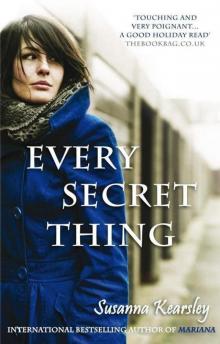 Every Secret Thing
Every Secret Thing The Rose Garden
The Rose Garden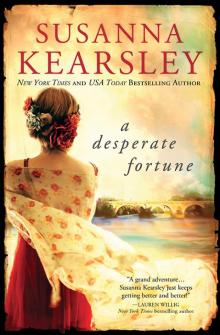 A Desperate Fortune
A Desperate Fortune The Winter Sea
The Winter Sea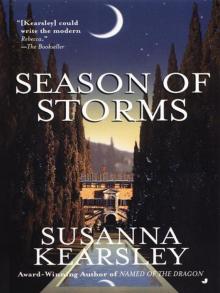 Season of Storms
Season of Storms Mariana
Mariana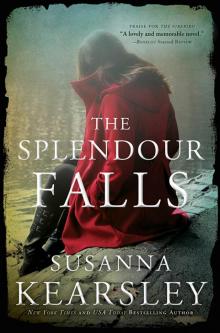 The Splendour Falls
The Splendour Falls Named of the Dragon
Named of the Dragon Sophia's Secret
Sophia's Secret The Shadowy Horses
The Shadowy Horses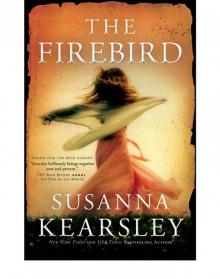 The Firebird
The Firebird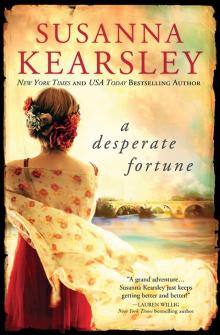 Desperate Fortune
Desperate Fortune